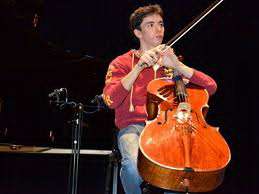|
Back
Eastern Horizons with the Orchestre Métropolitain Montréal
Maison symphonique de Montréal, Place des Arts
04/12/2012 -
Bedrich Smetana: The Bartered Bride: Overture
Antonín Dvorák: Cello Concerto in B minor, op. 104
Zoltán Kodály: Dances of Galánta
Béla Bartók: The Miraculous Mandarin, Suite from the Ballet, sz. 73/op. 19
Stéphane Tétreault (Cello)
Orchestre Métropolitain, Julian Kuerti (Conductor)

S. Tétreault (© music.cbc.ca)
Should a 19-year old be performing Dvorák’s Cello Concerto? On the evidence of Thursday evening’s concert of the Orchestre Métropolitain in Montreal, the answer is no. Stéphane Tétreault has been participating in many competitions since winning the Orchestre symphonique de Montréal Standard Life competition in 2007, but he should be polishing his skills with Haydn and Boccherini before tackling the summit of the solo cello repertory. At this point he has neither the physical nor the emotional heft to render justice to the Dvorák concerto. Although he made some fine starts with lush and heartfelt playing, it was clear that he didn’t know how to continue. There was little emotional line to shape the work. His technique and dynamic interpretations were impressive but he often appeared to be struggling with the instrument rather than using it as an extension of himself. Orchestral support under the baton of Julian Kuerti (the son of Canadian pianist Anton Kuerti) was lukewarm, but with impressive unity in the strings and horns, including superb solos from principal horn Louis-Philippe Marsolais.
Tétreault premiered for Montreal audiences the 1707 “Countess of Stainlein, Ex-Paganini” Stradivarius recently purchased by Montreal arts patron Jacqueline Desmarais for over $6 million. It was previously owned by Bernard Greenhouse, one of the founding members of the Beaux Arts Trio, and on which he recorded the Dvorák concerto in 1969.
Two fine performances followed intermission. Both Kodály’s Dances of Galánta and Bartók’s The Miraculous Mandarin had bite and personality, but could have used more. In the Kodály, Kuerti maintained tight control of the alternating tempos, with a fine sense of color and lightness to the rhythms. The stately principal melody on the solo clarinet was delivered exquisitely, as were the flute and the oboe solos. However, the triple forte in the opening horn solo was uncalled for.
Bartóks’ The Miraculous Mandarin was the best prepared and the most successfully performed work on the program. The playing was energetic and tight, the overall sound less muddy than in the Dvorák, and the shifting moods of the score deftly realized. Sectional performances were good—particularly from the second violins and violas as well as the woodwinds. Tension was maintained beginning with the mandarin’s dance through to the rousing climax.
The concert opened with a breezy interpretation of the overture to Smetanas’ The Bartered Bride.
Earl Arthur Love
|